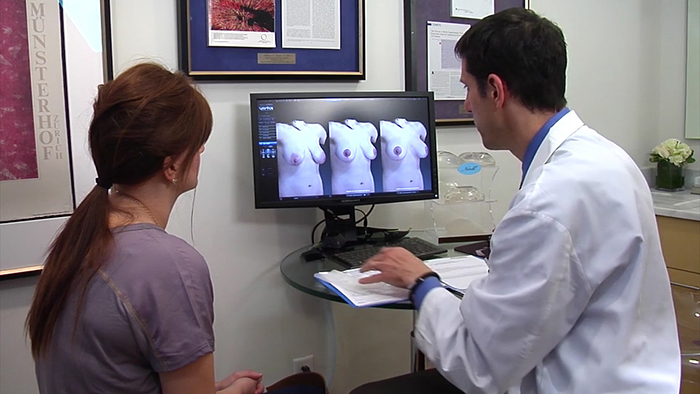When thinking about a cosmetic procedure, whether surgical or non-surgical, it is imperative to first schedule a consultation. The surgical consultation is the crucial first step in any plastic surgery journey. It is an opportunity for would-be patients to interview the surgeon – and for the surgeon to evaluate expectations, goals and anatomy to determine whether or not the patient is a candidate for the procedure.
Board certified plastic surgeon Dr. Kevin Smith of Charlotte, NC walks you through the various stages of a consultation so that those curious know both what to look for and what to expect.
The Consultation is About Developing a Relationship
The relationship between a patient and a plastic surgeon is a unique one. There needs to be a level of trust, and not just physically, but emotionally. This is why meeting in person is so important. It’s easy to go on a surgeon’s website and research his or hers education, training, and experience. But while a good website will give you a feel for the surgeon’s personality and philosophy, it is not the same thing as meeting in person. A web search will not tell if:
- the surgeon is a good listener
- if he or she come off as caring
- does the the surgeon have a competent staff
- is the surgeon’s aesthetic in line with your own
Consultation Allows Surgeons to Develop an Appropriate Roadmap
What happens in a consultation is really quite involved. Even if what you are discussing is Botox and fillers, “plastic surgery is real surgery,” explains Dr. Smith. These aren’t simple procedures and they must be taken seriously by both the patient and the surgeon.
The biggest part of any consultation is the development of a road map.
- Where you are now?
- Where do you want to go?
- What road do we want to take to get you there?
- Is the road a direct route or are there going to be several stops along the way?
Sometimes, achieving a patient’s desired result will require more than one procedure. And though some procedures can be safely combined, others need to be split up into phases.
Is the Procedure Right for You?
Oftentimes, when patients come in for a consultation, they have an idea in their mind of exactly which procedure will deliver their desired outcome. More times than not, what they want can not be achieved with the procedure in their mind. It’s really important for the plastic surgeon to determine what the patient wants and whether or not it is realistic. “Since we only have the fabric with which we are given to work with,” explains Dr. Smith, “a good plastic surgeon may need to tell the patient that what they want is not possible.” Or that it can only be achieved with a different procedure or combination of procedures. A good plastic surgeon will always be honest. “This is a give and take conversation with a surgeon,” says Dr. Smith. It’s about building a relationship through trust.
Medical History
During a consultation, the plastic surgeon or someone on his or her staff will take a complete medical history as well as a surgical history if one exists. If the patient has had prior surgeries, make sure to bring copies of what was done to the consultation. This will help bring the surgeon up to speed.
The surgeon will also ask you about any allergies that exist as well as medications that the would-be patient currently takes. This discussion must also include over the counter medications and supplements such as homeopathics and vitamins. Many medications will need to be stopped before surgery. The goal of these discussions is to make certain that the surgery is safe and that it is predictable.
Imaging
Another important part of the consultation, if appropriate, is imaging. Many surgeons use Vectra 3D imaging. When it comes to breasts, the system allows the surgeon to perform a virtual augmentation to decide the proper size and shape. There is also Visia imaging, which is a filtered high definition camera system that allows the surgeon to see how much damage lies below the surface of the skin when it comes to facial rejuvenation.
Old Photos = Blueprint
It is extremely helpful if patients bring in old photos, especially if the interest is in facial rejuvenation. There are some very powerful surgeries out there and it is the goal of any good plastic surgeon not to put patients in, “the witness protection program,” explains Dr. Smith. Old photos are one of the best ways for establishing a blueprint of, for example, what the eyes used to look like. This will help the surgeon to deliver a very natural look.
It’s also beneficial to bring in photographs of other people who have the “look” that patients would like to achieve. That old adage “a picture is worth a 1,000 words” is really true. Sometimes a patient will say one thing, but the photo shows another. Bottom line, photos are a great tool to guarantee that the patient and surgeon are on the same page.
Lifetime Relationship
The consultation is the beginning of what any surgeon hopes will be a lifetime relationship. As patients continue to age, they will continue to need age-appropriate procedures to turn back the hands of time. This may also include maintenance procedures such as skin care and lasers.
A plastic surgeon’s goal is to keep you looking like you, just the best version of you.



















Facebook
Twitter
Instagram
YouTube
RSS